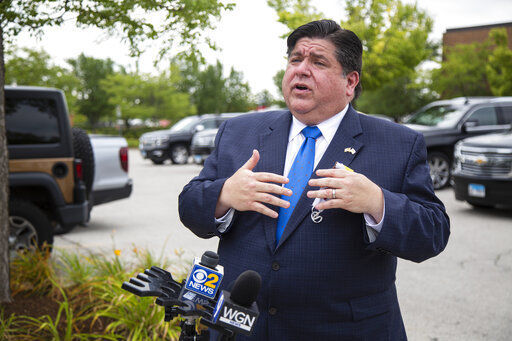SPRINGFIELD, Ill. — Gov. J.B. Pritzker today provided a substantive look at how he wants to make Illinois a completely renewable-energy state by 2050 with tighter controls on utility companies amid an influence-peddling scheme involving ComEd.
“Real accountability measures for utilities” is emphasized in the extensive, eight-part plan along with goals for providing a remedy for potentially disastrous climate change and pollution. It also aims to create sustainable jobs and a new age of 750,000 electric vehicles within the next decade.
The plan is not complete, and a working group that created the outline will continue, Deputy Gov. Christian Mitchell said Thursday. But given the federal government’s announcement last month that ComEd had entered into a deferred prosecution agreement to assist in a Statehouse bribery investigation, Mitchell said the administration is seeking public support before pushing ahead.
“We wanted to make sure that whatever we do to get 100% clean, renewable energy … we were going to do so with utility accountability at the center, so the public has some trust in the process,” Mitchell said.
The plan would end the ability of utilities to adjust rates outside of those set by regulators for purposes such as infrastructure improvements; prohibit utilities from recouping from ratepayers the “charitable contributions” through which they can curry political favors; and allow the Illinois Commerce Commission to implement a process to review utilities’ performance compared with rates.
ComEd spokeswoman Shannon Breymaier said the utility agrees with Pritzker that “the need for comprehensive energy reform has never been greater; we share the state’s commitment to clean energy, sustainability, utility affordability and transparency.”
Breymaier said the company has implemented ethics reforms to prevent future conduct revealed in the federal investigation while taking on the “challenge of rebuilding the trust of the public, regulators and elected officials” and working with them on the state’s clean-energy goals.
A spokeswoman for power company Ameren Illinois did not immediately respond to a request for comment.
In addition to creating a longer regulatory arm, the plan would increase protections for consumers. It would increase shareholder contributions from Exelon, ComEd’s parent, to a program that helps consumers catch up on bills affordably. It would double to a combined $67 million ComEd’s and Ameren’s commitment to low-income energy-efficiency programs. For low-income customers, there would no longer be a deposit charge, late fees or fees to pay bills online. Natural gas companies would be barred from automatically adding a monthly surcharge for infrastructure improvement.
Much of the remainder of the outline depends on providing incentives for investment in renewable energy. To put 750,000 electric vehicles on the road by 2030, for example, there’s about $70 million in the Democratic governor’s “Rebuild Illinois” infrastructure program for installing more charging stations, which are relatively scarce now.
Standardized zoning and siting regulations for wind and solar energy projects would speed development sometimes stymied by varied county ordinances. Existing business-development incentives offered by the Department of Commerce and Economic Opportunity would be expanded to include solar and energy-storage projects.
“If you’re an electric-vehicle company that is looking to expand production somewhere, we are making it clear that we’re both going to put in the charging infrastructure and the incentives to make your life easier,” Mitchell said. “We’re sending a market signal to bring in private investment.
The working group will continue developing the plan and Mitchell promised there would be extensive public discussion about it before any portions of it are presented to the General Assembly.


